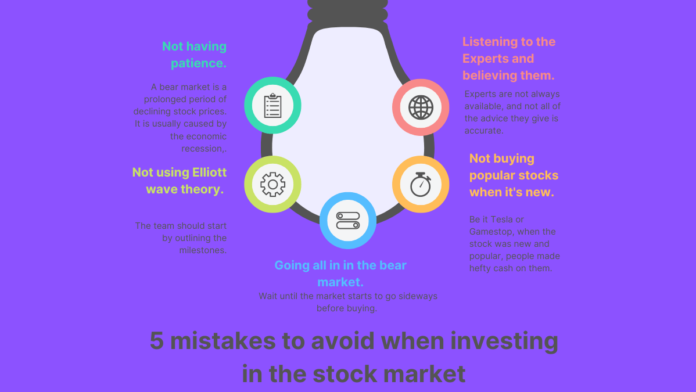The motto of the 90s was: “There is no short path to making money.” However, the narratives have changed. There are examples of people who have made it quick. There are examples of stars who have made it through songs, movies, and means of entertainment. It is the art that drives people from one phase of life to another. And so there is the stock market, business, and many other forms of making money. It is one of the most profound and meaningful arts of our time. Above all, this art needs to be crafted. Here are the most critical points to avoid when investing in the stock market.
Not having patience. The bear market takes its time.
A bear market is a prolonged period of declining stock prices. Economic recession, political uncertainty, and investor pessimism usually cause it. During a bear market, stocks can lose 20-30% of their value, and investors may be reluctant to purchase supplies for fear of further losses. There will be no quick money. If you can thrive in the market for years, you can double or triple your portfolio in the bull market.
Patience in the stock market is the ability to remain calm and composed when faced with market volatility. It is better to hold than panic sell, as market downturns are often short-lived, and the markets tend to recover over time. Having onto stocks for the long-term will allow investors to benefit from the growth potential of their investments, rather than selling out of fear and missing out on potential gains.
Not using Elliott wave theory.
It is an excellent analytical tool that helps you to know where the market is. Developed by Ralph Nelson Elliott in the 1930s, it is an approach to market analysis based on the observation of stock prices.
The Elliott Wave Theory is based on the concept that all financial markets, from stocks to bonds to commodities, tend to move in a series of five waves, each followed by a corrective wave of three waves. This pattern repeats itself over time, and Elliott believed that the study of the pattern could provide valuable insights into the direction of the markets.
Using Eliott Wave can at least give you insight into your position. Even if you are incorrect, you will be better than those who put money in the lost chart pattern. You will be ahead of the crowd.
Thinking that Expert advice is always true.
Expert advice can be precious, but it is also essential to analyze and learn independently. Experts are not always available, and not all of the advice they give is accurate. Therefore, thinking critically and using your judgment to determine the best course of action is essential. Additionally, learning independently about stocks can help you to gain a better understanding and develop your skills.
Choose your own stocks, and don’t rely on others’ advice. When you do your own research, you will know the root of each company. Consider the industry, the competition, the financials, and the management team. Seek to understand the risks and rewards associated with each stock. Only invest in something you understand.
Not buying popular stocks when it’s new.
There is money to be made if the popular stock is new. Be it Tesla or Gamestop, when the stock was new and popular, people made hefty cash on them. It is important to be early in the market when you buy stocks, as early investors often have the best chance of profiting from the stock market.
Investing early in the market allows you to benefit from potential price increases and dividend payments. Additionally, being early can help you avoid losses if the stock market declines.
Going all-in in the bear market.
Sometimes you have to hold cash in a bear market. The price can fall further. Highly experienced traders will never catch the price when it falls. Wait until the market starts to go sideways before buying. It is essential to understand the market sentiment and fundamentals before investing.
Do not put all your money in the bear market. Hold cash. Doing this will help you to preserve some of your capital and give you the flexibility to capitalize on opportunities that may arise in the future.
Additionally, diversifying your investments across different asset classes and sectors is also wise to keep you from any one sector or asset class during a bear market. Lastly, have a plan for when to exit the need to protect your capital and ensure that you do not incur further losses.
Always remember these 10 tips before putting your money on the market.
- Do not invest too much of your own money at once.
- Do not jump into stock investments without proper research and evaluation.
- Do not follow the herd; instead, make your own decisions.
- Do not invest in companies with high debt-to-equity ratios.
- Do not invest in companies with unsustainable growth rates.
- Do not invest in stocks backed by rumors or short-term gains.
- Do not invest in stocks with high volatility.
- Do not invest in stocks with low liquidity.
- Do not invest in stocks with no competitive advantage.
- Do not forget to diversify your portfolio.
More on Hajarkitta: The magic of the number three.
